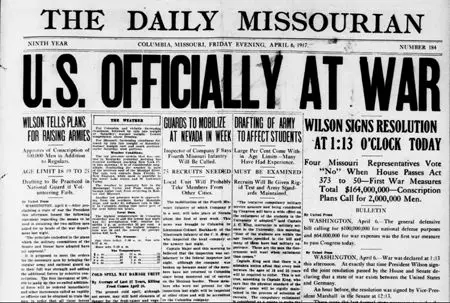US Declares War
U.S. Backstory
President Woodrow Wilson held a speech on April 2nd 1917, explaining why America was entering the war against Germany. Four days later on April 6th, a formal declaration of war followed. This speech was timed with the sinking of the Lusitania and the loss of several American lives.
Tempers were already boiling as Germany was sinking any neutral ship in war torn waters, so several American ships were already lost to the war. It didn’t help that media scrutiny was heavily against Germany and its policies during a War that had already gone on for too long.
The submarine warfare from Germany struck cargo ships, and hospital ships in particular that were clearly identified as safe. The speech could be summed up when President Woodrow Wilson referred to the German submarines as ‘outlaws’.


Germany Backstory
German Chancellor Theobald von Bethmann-Hollweg said in defense of his country that the submarine warfare was due to Britain’s illegal naval blockade of Germany. Regardless of the intent, he acknowledged that war with the Americans was unavoidable.
Bethmann-Hollweg also spoke of the rejected peace offers that were made towards Britain, which supposedly was several. Germany had no intention of going to war with America, and even mentioned how they gave notice to the United States about their unrestricted use of submarines as weapons.

French Backstory
French Prime Minister Alexandre Ribot was pleased with the decision of the United States to enter the war. For France and many other countries, the war had become about liberty and justice among the nations. France has always been a close ally to the United States, and even helped it gain its independence.
One of the most iconic statues of all time, the Statue of Liberty was actually a French gift to America in 1886. France welcomed the participation of the United States as brothers of democracy, and it came at a crucial time in World War 1.

British Backstory
British Prime Minister David Lloyd George shared the same sentiments as France, and had some interesting insight into the way Germany viewed America. He mentioned that Germany considered U.S. involvement to have minimal impact on the outcome of the war, and considered it an open insult to America.
He also did not fault the U.S. for waiting to take action, as no one planned for the war with the Germans to get this out of hand. Britain, much like France felt reassured that victory was inevitable.

Why did the U.S. Declare War?
Several American ships, crew members and passengers were attacked and killed by the German submarines. The Germans had given warnings and notices before the submarine warfare was put into place, and made it a point to sink all non-German vessels regardless of nationality.
The surprise attack on the Lusitania put America in a tight position, as the public outrage was massive across all countries. Sitting back and doing nothing would cast a bad light on the country, and many American lives were being lost at sea due to the attacks.

Who Was Affected?
Germany was affected the most, as this eventually led to them losing the war. The Allied forces were strong with the British Empire, France, Italy, America and the Russian Empire. This doesn’t include the nations that contributed to the Allied forces like Japan, Greece, Serbia, Belgium, Romania and several other nations.
The Central Powers were much smaller, and included Germany, Bulgaria and the Austria-Hungary and the Ottoman Empire.

Names to Remember
President Woodrow Wilson was born in 1856 and was the 28th president of the United States. He served two terms from 1913-1921, and was responsible for the decision to enter the war against Germany. He was the recipient of the 1919 Nobel Peace Prize, being only the third president ever to receive the award.

Important Facts
Here are some important things to remember about the U.S. declaring war on Germany.
- The Lusitania was the breaking point to America entering the war
- Germany claimed it had warned the U.S. of its submarine warfare and was not at fault
- The Allied forces were several times larger than the Central Powers

Summary
The U.S. entering the war made for a very powerful member of the Allied forces, joining an already extensive list of countries. The combined forces were enough to turn the tide of World War 1 decisively against the Germans.



